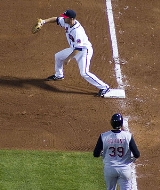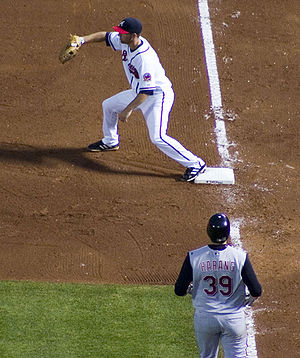
Force play
Encyclopedia

Baseball
Baseball is a bat-and-ball sport played between two teams of nine players each. The aim is to score runs by hitting a thrown ball with a bat and touching a series of four bases arranged at the corners of a ninety-foot diamond...
, a force is a situation when a baserunner is compelled (or forced) to vacate his time-of-pitch
Time of pitch
In baseball, the time of pitch is that instant when the pitcher has begun his pitching motion and, by the rules, has committed himself to throwing the pitch. This instant thus occurs before the pitcher actually releases the ball. Once a pitcher commits himself to throwing a pitch, it is illegal...
base—and thus try to advance to the next base—because the batter became a runner. A runner at first base is always forced to attempt to advance to second base when the batter becomes a runner. Runners at second or third base
Third Base
is a 1978 Japanese film directed by Yōichi Higashi.-External links:...
are forced only when all bases preceding their time-of-pitch base are occupied by other baserunners and the batter becomes a runner.
A forced runner's force base is the next base beyond his time-of-pitch base. Any attempt by fielders to put a forced runner out
Out (baseball)
In baseball, an out occurs when the defensive, or fielding, team effects any of a number of different events, and the umpire rules a batter or baserunner out. When a player is called out, he is said to be retired...
is called a force play. A forced runner is out (called a force out) when a fielder with the ball touches the runner's force base before the runner reaches that base. A forced runner also may be tagged out
Tag out
In baseball, a tag out, sometimes just called a tag, is a play in which a baserunner is out because he is touched by the fielder's hand or glove holding a live ball while the runner is in jeopardy...
in the usual fashion as well; such a tag is still considered a force play if the tag is made before the runner reaches his force base. Any play on the batter-runner before he reaches first base is the same as a force play, though the rules do not include this in the definition of a force play.
A force on a runner is "removed" when the batter or a following runner is put out. This most often happens on fly outs—on such, the batter-runner is out, and the other runner(s) must return to their time-of-pitch base, known as tagging up
Tag up
In baseball, to tag up is to retouch or remain on the runner's time-of-pitch base until the ball either lands in fair territory or is first touched by a fielder. A runner must, by rule, tag up only when a batted ball is caught by a fielder . After a legal tag up, even if the ball was caught in...
.
Force outs may also be called on neighborhood play
Neighborhood play
In baseball, a neighborhood play is a force play where a fielder receiving the ball in attempting to force out a runner at second base, catches and quickly throws the ball to first base in a double play attempt without actually touching second base, or by touching second base well before catching...
s, though this tradition goes against the rules.
Scoring on force outs
No runRun (baseball)
In baseball, a run is scored when a player advances around first, second and third base and returns safely to home plate, touching the bases in that order, before three outs are recorded and all obligations to reach base safely on batted balls are met or assured...
can be scored during the same continuous playing action as a force out for the third out, even if a runner reaches home plate
Home Plate
Home Plate is the fifth album by Bonnie Raitt, released in 1975 .-Track listing:#"What Do You Want the Boy to Do?" – 3:19#"Good Enough" – 2:56#"Run Like a Thief" – 3:02...
before the third out is recorded. As a result, on a batted ball with two outs, fielders will nearly always ignore a runner trying to score, attempting instead to force out the batter or another runner.
An appeal play
Appeal play
In baseball, an appeal play occurs when a member of the defensive team calls the attention of an umpire to an infraction which he would otherwise ignore.-Appeal Play Situations:A runner shall be called out, after a successful live ball appeal, if he:...
may also be a force play; for example, with runners on first and third bases and two out, the batter gets a hit but the runner from first misses second base on the way to third. After a proper appeal, this runner will be called out. This is a force out because the runner was out for failing to touch a base to which he was forced; this force out is the third out and thus the run does not score. However, most appeals are not force plays, because appeals usually do not involve a forced runner.

